

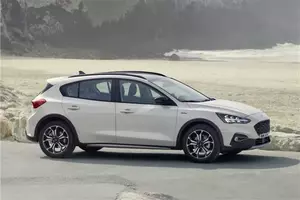
2019 Focus IV Active Hatchback
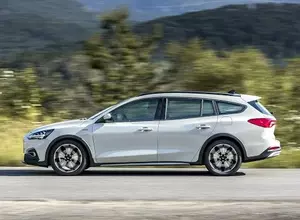
2019 Focus IV Active Wagon
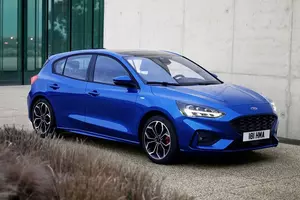
2019 Focus IV Hatchback

2019 Focus IV Wagon
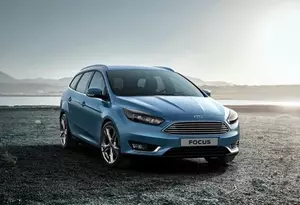
2014 Focus III Wagon (facelift 2014)
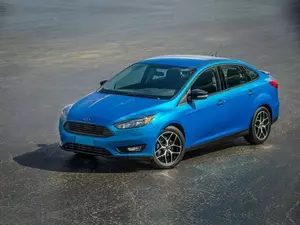
2014 Focus III Sedan (facelift 2014)

2014 Focus III Hatchback (facelift 2014)
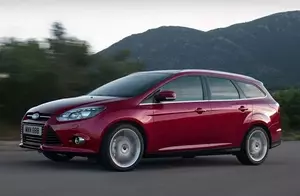
2013 Focus III Wagon
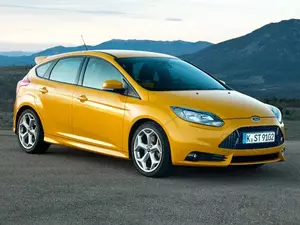
2013 Focus III Hatchback

Focus II Hatchback
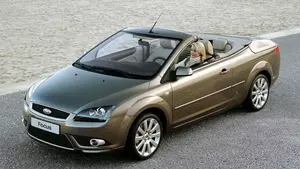
Focus Cabriolet II
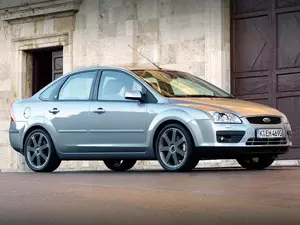
Focus II Sedan
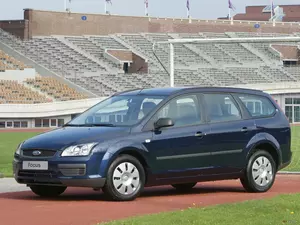
Focus Turnier II

Focus Hatchback I
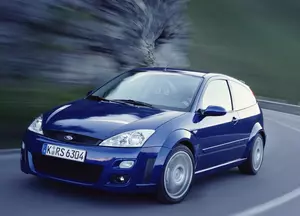
2000 Focus Hatchback (USA)

Focus Turnier I
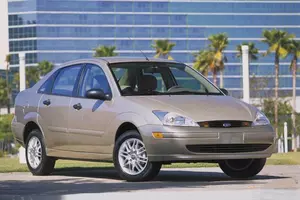
2000 Focus Sedan (USA)
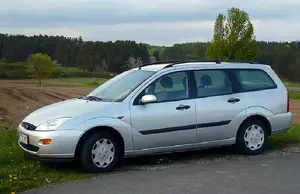
2000 Focus Turnier (USA)
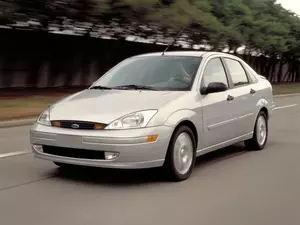
Focus I Sedan

| Vehicle | Precise engine size | Difference from world average | Engine size to consumption ratio | Horsepower from 1 L | Engine size to 100 kg of weight |
|---|---|---|---|---|---|
| 1.5 EcoBoost |
1.5 L (1497 cc) |
36.2% smaller | 37 cc to 1 mpg | 121 hp from 1 L | 115 cc to 100 kg |
| 1.0 EcoBoost |
1 L (999 cc) |
57.4% smaller | 20 cc to 1 mpg | 125 hp from 1 L | 83 cc to 100 kg |
| Vehicle | 1.5 EcoBoost |
|---|---|
| Precise engine size | 1.5 L (1497 cc) |
| Difference from world average | 36.2 smaller |
| Engine size to consumption ratio | 37 cc to 1 mpg |
| Horsepower from 1 L | 121 hp from 1 L |
| Engine size to 100 kg of weight | 115 cc to 100 kg |
| Vehicle | 1.0 EcoBoost |
| Precise engine size | 1 L (999 cc) |
| Difference from world average | 57.4 smaller |
| Engine size to consumption ratio | 20 cc to 1 mpg |
| Horsepower from 1 L | 125 hp from 1 L |
| Engine size to 100 kg of weight | 83 cc to 100 kg |

| Vehicle | Precise engine size | Difference from world average | Engine size to consumption ratio | Horsepower from 1 L | Engine size to 100 kg of weight |
|---|---|---|---|---|---|
| 1.5 EcoBoost |
1.5 L (1497 cc) |
36.2% smaller | 37 cc to 1 mpg | 121 hp from 1 L | 107 cc to 100 kg |
| 1.0 EcoBoost |
1 L (999 cc) |
57.4% smaller | 20 cc to 1 mpg | 125 hp from 1 L | 77 cc to 100 kg |
| Vehicle | 1.5 EcoBoost |
|---|---|
| Precise engine size | 1.5 L (1497 cc) |
| Difference from world average | 36.2 smaller |
| Engine size to consumption ratio | 37 cc to 1 mpg |
| Horsepower from 1 L | 121 hp from 1 L |
| Engine size to 100 kg of weight | 107 cc to 100 kg |
| Vehicle | 1.0 EcoBoost |
| Precise engine size | 1 L (999 cc) |
| Difference from world average | 57.4 smaller |
| Engine size to consumption ratio | 20 cc to 1 mpg |
| Horsepower from 1 L | 125 hp from 1 L |
| Engine size to 100 kg of weight | 77 cc to 100 kg |

| Vehicle | Precise engine size | Difference from world average | Engine size to consumption ratio | Horsepower from 1 L | Engine size to 100 kg of weight |
|---|---|---|---|---|---|
| 1.0 EcoBoost |
1 L (999 cc) |
57.4% smaller | 20 cc to 1 mpg | 125 hp from 1 L | 83 cc to 100 kg |
| 1.5 EcoBoost |
1.5 L (1497 cc) |
36.2% smaller | 37 cc to 1 mpg | 100 hp from 1 L | 115 cc to 100 kg |
| 1.5 EcoBlue |
1.5 L (1500 cc) |
36.1% smaller | 23 cc to 1 mpg | 80 hp from 1 L | 115 cc to 100 kg |
| 2.0 EcoBlue |
2 L (1996 cc) |
14.9% smaller | 38 cc to 1 mpg | 75 hp from 1 L | 143 cc to 100 kg |
| Vehicle | 1.0 EcoBoost |
|---|---|
| Precise engine size | 1 L (999 cc) |
| Difference from world average | 57.4 smaller |
| Engine size to consumption ratio | 20 cc to 1 mpg |
| Horsepower from 1 L | 125 hp from 1 L |
| Engine size to 100 kg of weight | 83 cc to 100 kg |
| Vehicle | 1.5 EcoBoost |
| Precise engine size | 1.5 L (1497 cc) |
| Difference from world average | 36.2 smaller |
| Engine size to consumption ratio | 37 cc to 1 mpg |
| Horsepower from 1 L | 100 hp from 1 L |
| Engine size to 100 kg of weight | 115 cc to 100 kg |
| Vehicle | 1.5 EcoBlue |
| Precise engine size | 1.5 L (1500 cc) |
| Difference from world average | 36.1 smaller |
| Engine size to consumption ratio | 23 cc to 1 mpg |
| Horsepower from 1 L | 80 hp from 1 L |
| Engine size to 100 kg of weight | 115 cc to 100 kg |
| Vehicle | 2.0 EcoBlue |
| Precise engine size | 2 L (1996 cc) |
| Difference from world average | 14.9 smaller |
| Engine size to consumption ratio | 38 cc to 1 mpg |
| Horsepower from 1 L | 75 hp from 1 L |
| Engine size to 100 kg of weight | 143 cc to 100 kg |

| Vehicle | Precise engine size | Difference from world average | Engine size to consumption ratio | Horsepower from 1 L | Engine size to 100 kg of weight |
|---|---|---|---|---|---|
| 1.0 EcoBoost |
1 L (999 cc) |
57.4% smaller | 24 cc to 1 mpg | 125 hp from 1 L | 71 cc to 100 kg |
| 1.5 EcoBoost |
1.5 L (1497 cc) |
36.2% smaller | 36 cc to 1 mpg | 121 hp from 1 L | 115 cc to 100 kg |
| 2.0 EcoBlue |
2 L (1996 cc) |
14.9% smaller | 38 cc to 1 mpg | 75 hp from 1 L | 133 cc to 100 kg |
| 1.5 EcoBlue |
1.5 L (1500 cc) |
36.1% smaller | 29 cc to 1 mpg | 80 hp from 1 L | 107 cc to 100 kg |
| Vehicle | 1.0 EcoBoost |
|---|---|
| Precise engine size | 1 L (999 cc) |
| Difference from world average | 57.4 smaller |
| Engine size to consumption ratio | 24 cc to 1 mpg |
| Horsepower from 1 L | 125 hp from 1 L |
| Engine size to 100 kg of weight | 71 cc to 100 kg |
| Vehicle | 1.5 EcoBoost |
| Precise engine size | 1.5 L (1497 cc) |
| Difference from world average | 36.2 smaller |
| Engine size to consumption ratio | 36 cc to 1 mpg |
| Horsepower from 1 L | 121 hp from 1 L |
| Engine size to 100 kg of weight | 115 cc to 100 kg |
| Vehicle | 2.0 EcoBlue |
| Precise engine size | 2 L (1996 cc) |
| Difference from world average | 14.9 smaller |
| Engine size to consumption ratio | 38 cc to 1 mpg |
| Horsepower from 1 L | 75 hp from 1 L |
| Engine size to 100 kg of weight | 133 cc to 100 kg |
| Vehicle | 1.5 EcoBlue |
| Precise engine size | 1.5 L (1500 cc) |
| Difference from world average | 36.1 smaller |
| Engine size to consumption ratio | 29 cc to 1 mpg |
| Horsepower from 1 L | 80 hp from 1 L |
| Engine size to 100 kg of weight | 107 cc to 100 kg |

| Vehicle | Precise engine size | Difference from world average | Engine size to consumption ratio | Horsepower from 1 L | Engine size to 100 kg of weight |
|---|---|---|---|---|---|
| 1.0 EcoBoost |
1 L (998 cc) |
57.5% smaller | 20 cc to 1 mpg | 100 hp from 1 L | 67 cc to 100 kg |
| 1.5 EcoBoost |
1.5 L (1499 cc) |
36.1% smaller | 36 cc to 1 mpg | 100 hp from 1 L | 94 cc to 100 kg |
| 1.6 Ti-VCT |
1.6 L (1596 cc) |
32% smaller | 41 cc to 1 mpg | 66 hp from 1 L | 106 cc to 100 kg |
| 1.6 TDCi |
1.56 L (1560 cc) |
33.5% smaller | 30 cc to 1 mpg | 61 hp from 1 L | 104 cc to 100 kg |
| 2.0 TDCi |
2 L (1997 cc) |
14.9% smaller | 38 cc to 1 mpg | 75 hp from 1 L | 117 cc to 100 kg |
| 1.5 TDCi |
1.5 L (1499 cc) |
36.1% smaller | 24 cc to 1 mpg | 80 hp from 1 L | 94 cc to 100 kg |
| ST 2.0 TDCi |
2 L (1997 cc) |
14.9% smaller | 38 cc to 1 mpg | 93 hp from 1 L | 133 cc to 100 kg |
| ST 2.0 EcoBoost |
2 L (2000 cc) |
14.7% smaller | 57 cc to 1 mpg | 125 hp from 1 L | 133 cc to 100 kg |
| Vehicle | 1.0 EcoBoost |
|---|---|
| Precise engine size | 1 L (998 cc) |
| Difference from world average | 57.5 smaller |
| Engine size to consumption ratio | 20 cc to 1 mpg |
| Horsepower from 1 L | 100 hp from 1 L |
| Engine size to 100 kg of weight | 67 cc to 100 kg |
| Vehicle | 1.5 EcoBoost |
| Precise engine size | 1.5 L (1499 cc) |
| Difference from world average | 36.1 smaller |
| Engine size to consumption ratio | 36 cc to 1 mpg |
| Horsepower from 1 L | 100 hp from 1 L |
| Engine size to 100 kg of weight | 94 cc to 100 kg |
| Vehicle | 1.6 Ti-VCT |
| Precise engine size | 1.6 L (1596 cc) |
| Difference from world average | 32 smaller |
| Engine size to consumption ratio | 41 cc to 1 mpg |
| Horsepower from 1 L | 66 hp from 1 L |
| Engine size to 100 kg of weight | 106 cc to 100 kg |
| Vehicle | 1.6 TDCi |
| Precise engine size | 1.56 L (1560 cc) |
| Difference from world average | 33.5 smaller |
| Engine size to consumption ratio | 30 cc to 1 mpg |
| Horsepower from 1 L | 61 hp from 1 L |
| Engine size to 100 kg of weight | 104 cc to 100 kg |
| Vehicle | 2.0 TDCi |
| Precise engine size | 2 L (1997 cc) |
| Difference from world average | 14.9 smaller |
| Engine size to consumption ratio | 38 cc to 1 mpg |
| Horsepower from 1 L | 75 hp from 1 L |
| Engine size to 100 kg of weight | 117 cc to 100 kg |
| Vehicle | 1.5 TDCi |
| Precise engine size | 1.5 L (1499 cc) |
| Difference from world average | 36.1 smaller |
| Engine size to consumption ratio | 24 cc to 1 mpg |
| Horsepower from 1 L | 80 hp from 1 L |
| Engine size to 100 kg of weight | 94 cc to 100 kg |
| Vehicle | ST 2.0 TDCi |
| Precise engine size | 2 L (1997 cc) |
| Difference from world average | 14.9 smaller |
| Engine size to consumption ratio | 38 cc to 1 mpg |
| Horsepower from 1 L | 93 hp from 1 L |
| Engine size to 100 kg of weight | 133 cc to 100 kg |
| Vehicle | ST 2.0 EcoBoost |
| Precise engine size | 2 L (2000 cc) |
| Difference from world average | 14.7 smaller |
| Engine size to consumption ratio | 57 cc to 1 mpg |
| Horsepower from 1 L | 125 hp from 1 L |
| Engine size to 100 kg of weight | 133 cc to 100 kg |

| Vehicle | Precise engine size | Difference from world average | Engine size to consumption ratio | Horsepower from 1 L | Engine size to 100 kg of weight |
|---|---|---|---|---|---|
| 1.0 EcoBoost |
1 L (998 cc) |
57.5% smaller | 20 cc to 1 mpg | 125 hp from 1 L | 77 cc to 100 kg |
| 1.5 EcoBoost |
1.5 L (1499 cc) |
36.1% smaller | 36 cc to 1 mpg | 121 hp from 1 L | 107 cc to 100 kg |
| 1.6 Ti-VCT |
1.6 L (1596 cc) |
32% smaller | 43 cc to 1 mpg | 78 hp from 1 L | 123 cc to 100 kg |
| 1.5 TDCi |
1.5 L (1499 cc) |
36.1% smaller | 24 cc to 1 mpg | 80 hp from 1 L | 107 cc to 100 kg |
| 1.6 TDCi |
1.56 L (1560 cc) |
33.5% smaller | 30 cc to 1 mpg | 74 hp from 1 L | 120 cc to 100 kg |
| 2.0 TDCi |
2 L (1997 cc) |
14.9% smaller | 41 cc to 1 mpg | 75 hp from 1 L | 133 cc to 100 kg |
| Vehicle | 1.0 EcoBoost |
|---|---|
| Precise engine size | 1 L (998 cc) |
| Difference from world average | 57.5 smaller |
| Engine size to consumption ratio | 20 cc to 1 mpg |
| Horsepower from 1 L | 125 hp from 1 L |
| Engine size to 100 kg of weight | 77 cc to 100 kg |
| Vehicle | 1.5 EcoBoost |
| Precise engine size | 1.5 L (1499 cc) |
| Difference from world average | 36.1 smaller |
| Engine size to consumption ratio | 36 cc to 1 mpg |
| Horsepower from 1 L | 121 hp from 1 L |
| Engine size to 100 kg of weight | 107 cc to 100 kg |
| Vehicle | 1.6 Ti-VCT |
| Precise engine size | 1.6 L (1596 cc) |
| Difference from world average | 32 smaller |
| Engine size to consumption ratio | 43 cc to 1 mpg |
| Horsepower from 1 L | 78 hp from 1 L |
| Engine size to 100 kg of weight | 123 cc to 100 kg |
| Vehicle | 1.5 TDCi |
| Precise engine size | 1.5 L (1499 cc) |
| Difference from world average | 36.1 smaller |
| Engine size to consumption ratio | 24 cc to 1 mpg |
| Horsepower from 1 L | 80 hp from 1 L |
| Engine size to 100 kg of weight | 107 cc to 100 kg |
| Vehicle | 1.6 TDCi |
| Precise engine size | 1.56 L (1560 cc) |
| Difference from world average | 33.5 smaller |
| Engine size to consumption ratio | 30 cc to 1 mpg |
| Horsepower from 1 L | 74 hp from 1 L |
| Engine size to 100 kg of weight | 120 cc to 100 kg |
| Vehicle | 2.0 TDCi |
| Precise engine size | 2 L (1997 cc) |
| Difference from world average | 14.9 smaller |
| Engine size to consumption ratio | 41 cc to 1 mpg |
| Horsepower from 1 L | 75 hp from 1 L |
| Engine size to 100 kg of weight | 133 cc to 100 kg |

| Vehicle | Precise engine size | Difference from world average | Engine size to consumption ratio | Horsepower from 1 L | Engine size to 100 kg of weight |
|---|---|---|---|---|---|
| RS 2.3 EcoBoost |
2.26 L (2261 cc) |
3.6% smaller | 73 cc to 1 mpg | 155 hp from 1 L | 151 cc to 100 kg |
| 1.0 EcoBoost |
1 L (998 cc) |
57.5% smaller | 20 cc to 1 mpg | 125 hp from 1 L | 77 cc to 100 kg |
| 1.5 EcoBoost |
1.5 L (1499 cc) |
36.1% smaller | 35 cc to 1 mpg | 121 hp from 1 L | 115 cc to 100 kg |
| 1.5 TDCi |
1.5 L (1499 cc) |
36.1% smaller | 24 cc to 1 mpg | 80 hp from 1 L | 115 cc to 100 kg |
| 1.6 Ti-VCT |
1.6 L (1596 cc) |
32% smaller | 40 cc to 1 mpg | 66 hp from 1 L | 123 cc to 100 kg |
| 1.6 TDCi |
1.56 L (1560 cc) |
33.5% smaller | 30 cc to 1 mpg | 61 hp from 1 L | 120 cc to 100 kg |
| 2.0 TDCi |
2 L (1997 cc) |
14.9% smaller | 41 cc to 1 mpg | 75 hp from 1 L | 133 cc to 100 kg |
| ST 2.0 EcoBoost |
2 L (2000 cc) |
14.7% smaller | 57 cc to 1 mpg | 125 hp from 1 L | 143 cc to 100 kg |
| ST 2.0 TDCi |
2 L (1997 cc) |
14.9% smaller | 38 cc to 1 mpg | 93 hp from 1 L | 133 cc to 100 kg |
| Vehicle | RS 2.3 EcoBoost |
|---|---|
| Precise engine size | 2.26 L (2261 cc) |
| Difference from world average | 3.6 smaller |
| Engine size to consumption ratio | 73 cc to 1 mpg |
| Horsepower from 1 L | 155 hp from 1 L |
| Engine size to 100 kg of weight | 151 cc to 100 kg |
| Vehicle | 1.0 EcoBoost |
| Precise engine size | 1 L (998 cc) |
| Difference from world average | 57.5 smaller |
| Engine size to consumption ratio | 20 cc to 1 mpg |
| Horsepower from 1 L | 125 hp from 1 L |
| Engine size to 100 kg of weight | 77 cc to 100 kg |
| Vehicle | 1.5 EcoBoost |
| Precise engine size | 1.5 L (1499 cc) |
| Difference from world average | 36.1 smaller |
| Engine size to consumption ratio | 35 cc to 1 mpg |
| Horsepower from 1 L | 121 hp from 1 L |
| Engine size to 100 kg of weight | 115 cc to 100 kg |
| Vehicle | 1.5 TDCi |
| Precise engine size | 1.5 L (1499 cc) |
| Difference from world average | 36.1 smaller |
| Engine size to consumption ratio | 24 cc to 1 mpg |
| Horsepower from 1 L | 80 hp from 1 L |
| Engine size to 100 kg of weight | 115 cc to 100 kg |
| Vehicle | 1.6 Ti-VCT |
| Precise engine size | 1.6 L (1596 cc) |
| Difference from world average | 32 smaller |
| Engine size to consumption ratio | 40 cc to 1 mpg |
| Horsepower from 1 L | 66 hp from 1 L |
| Engine size to 100 kg of weight | 123 cc to 100 kg |
| Vehicle | 1.6 TDCi |
| Precise engine size | 1.56 L (1560 cc) |
| Difference from world average | 33.5 smaller |
| Engine size to consumption ratio | 30 cc to 1 mpg |
| Horsepower from 1 L | 61 hp from 1 L |
| Engine size to 100 kg of weight | 120 cc to 100 kg |
| Vehicle | 2.0 TDCi |
| Precise engine size | 2 L (1997 cc) |
| Difference from world average | 14.9 smaller |
| Engine size to consumption ratio | 41 cc to 1 mpg |
| Horsepower from 1 L | 75 hp from 1 L |
| Engine size to 100 kg of weight | 133 cc to 100 kg |
| Vehicle | ST 2.0 EcoBoost |
| Precise engine size | 2 L (2000 cc) |
| Difference from world average | 14.7 smaller |
| Engine size to consumption ratio | 57 cc to 1 mpg |
| Horsepower from 1 L | 125 hp from 1 L |
| Engine size to 100 kg of weight | 143 cc to 100 kg |
| Vehicle | ST 2.0 TDCi |
| Precise engine size | 2 L (1997 cc) |
| Difference from world average | 14.9 smaller |
| Engine size to consumption ratio | 38 cc to 1 mpg |
| Horsepower from 1 L | 93 hp from 1 L |
| Engine size to 100 kg of weight | 133 cc to 100 kg |

| Vehicle | Precise engine size | Difference from world average | Engine size to consumption ratio | Horsepower from 1 L | Engine size to 100 kg of weight |
|---|---|---|---|---|---|
| 1.6 Ti-VCT |
1.6 L (1596 cc) |
32% smaller | 41 cc to 1 mpg | 78 hp from 1 L | 123 cc to 100 kg |
| 1.6 EcoBoost |
1.6 L (1596 cc) |
32% smaller | 41 cc to 1 mpg | 114 hp from 1 L | 114 cc to 100 kg |
| 2.0 TDCi |
2 L (1997 cc) |
14.9% smaller | 45 cc to 1 mpg | 82 hp from 1 L | 133 cc to 100 kg |
| 1.6 TDCi |
1.56 L (1560 cc) |
33.5% smaller | 28 cc to 1 mpg | 74 hp from 1 L | 111 cc to 100 kg |
| ST 2.0 EcoBoost |
2 L (2000 cc) |
14.7% smaller | 61 cc to 1 mpg | 125 hp from 1 L | 143 cc to 100 kg |
| Vehicle | 1.6 Ti-VCT |
|---|---|
| Precise engine size | 1.6 L (1596 cc) |
| Difference from world average | 32 smaller |
| Engine size to consumption ratio | 41 cc to 1 mpg |
| Horsepower from 1 L | 78 hp from 1 L |
| Engine size to 100 kg of weight | 123 cc to 100 kg |
| Vehicle | 1.6 EcoBoost |
| Precise engine size | 1.6 L (1596 cc) |
| Difference from world average | 32 smaller |
| Engine size to consumption ratio | 41 cc to 1 mpg |
| Horsepower from 1 L | 114 hp from 1 L |
| Engine size to 100 kg of weight | 114 cc to 100 kg |
| Vehicle | 2.0 TDCi |
| Precise engine size | 2 L (1997 cc) |
| Difference from world average | 14.9 smaller |
| Engine size to consumption ratio | 45 cc to 1 mpg |
| Horsepower from 1 L | 82 hp from 1 L |
| Engine size to 100 kg of weight | 133 cc to 100 kg |
| Vehicle | 1.6 TDCi |
| Precise engine size | 1.56 L (1560 cc) |
| Difference from world average | 33.5 smaller |
| Engine size to consumption ratio | 28 cc to 1 mpg |
| Horsepower from 1 L | 74 hp from 1 L |
| Engine size to 100 kg of weight | 111 cc to 100 kg |
| Vehicle | ST 2.0 EcoBoost |
| Precise engine size | 2 L (2000 cc) |
| Difference from world average | 14.7 smaller |
| Engine size to consumption ratio | 61 cc to 1 mpg |
| Horsepower from 1 L | 125 hp from 1 L |
| Engine size to 100 kg of weight | 143 cc to 100 kg |

| Vehicle | Precise engine size | Difference from world average | Engine size to consumption ratio | Horsepower from 1 L | Engine size to 100 kg of weight |
|---|---|---|---|---|---|
| ST 2.0 EcoBoost |
2 L (2000 cc) |
14.7% smaller | 61 cc to 1 mpg | 125 hp from 1 L | 143 cc to 100 kg |
| Vehicle | ST 2.0 EcoBoost |
|---|---|
| Precise engine size | 2 L (2000 cc) |
| Difference from world average | 14.7 smaller |
| Engine size to consumption ratio | 61 cc to 1 mpg |
| Horsepower from 1 L | 125 hp from 1 L |
| Engine size to 100 kg of weight | 143 cc to 100 kg |

| Vehicle | Precise engine size | Difference from world average | Engine size to consumption ratio | Horsepower from 1 L | Engine size to 100 kg of weight |
|---|---|---|---|---|---|
| 1.4 Duratec 16V |
1.39 L (1388 cc) |
40.8% smaller | 39 cc to 1 mpg | 58 hp from 1 L | 116 cc to 100 kg |
| 1.6 Duratec 16V |
1.6 L (1596 cc) |
32% smaller | 46 cc to 1 mpg | 63 hp from 1 L | 133 cc to 100 kg |
| 1.8 TDCi |
1.75 L (1753 cc) |
25.3% smaller | 39 cc to 1 mpg | 66 hp from 1 L | 125 cc to 100 kg |
| 1.6 Duratec Ti-VCR 16V |
1.6 L (1596 cc) |
32% smaller | 43 cc to 1 mpg | 72 hp from 1 L | 123 cc to 100 kg |
| 2.0 Duratec 16V |
2 L (1999 cc) |
14.8% smaller | 61 cc to 1 mpg | 73 hp from 1 L | 154 cc to 100 kg |
| 1.6 TDCi |
1.56 L (1560 cc) |
33.5% smaller | - | 58 hp from 1 L | 120 cc to 100 kg |
| 1.6 TDCi HP |
1.56 L (1560 cc) |
33.5% smaller | 35 cc to 1 mpg | 70 hp from 1 L | 120 cc to 100 kg |
| 1.8 i 16V |
1.8 L (1798 cc) |
23.4% smaller | - | 69 hp from 1 L | 138 cc to 100 kg |
| 2.0 16V |
2 L (1999 cc) |
14.8% smaller | 77 cc to 1 mpg | 73 hp from 1 L | 154 cc to 100 kg |
| 2.0 TDCi |
2 L (1997 cc) |
14.9% smaller | - | 68 hp from 1 L | 154 cc to 100 kg |
| ST 2.5 i 20V |
2.52 L (2522 cc) |
7.5% bigger | 101 cc to 1 mpg | 89 hp from 1 L | 180 cc to 100 kg |
| RS 2.5 |
2.52 L (2522 cc) |
7.5% bigger | 101 cc to 1 mpg | 121 hp from 1 L | 168 cc to 100 kg |
| Vehicle | 1.4 Duratec 16V |
|---|---|
| Precise engine size | 1.39 L (1388 cc) |
| Difference from world average | 40.8 smaller |
| Engine size to consumption ratio | 39 cc to 1 mpg |
| Horsepower from 1 L | 58 hp from 1 L |
| Engine size to 100 kg of weight | 116 cc to 100 kg |
| Vehicle | 1.6 Duratec 16V |
| Precise engine size | 1.6 L (1596 cc) |
| Difference from world average | 32 smaller |
| Engine size to consumption ratio | 46 cc to 1 mpg |
| Horsepower from 1 L | 63 hp from 1 L |
| Engine size to 100 kg of weight | 133 cc to 100 kg |
| Vehicle | 1.8 TDCi |
| Precise engine size | 1.75 L (1753 cc) |
| Difference from world average | 25.3 smaller |
| Engine size to consumption ratio | 39 cc to 1 mpg |
| Horsepower from 1 L | 66 hp from 1 L |
| Engine size to 100 kg of weight | 125 cc to 100 kg |
| Vehicle | 1.6 Duratec Ti-VCR 16V |
| Precise engine size | 1.6 L (1596 cc) |
| Difference from world average | 32 smaller |
| Engine size to consumption ratio | 43 cc to 1 mpg |
| Horsepower from 1 L | 72 hp from 1 L |
| Engine size to 100 kg of weight | 123 cc to 100 kg |
| Vehicle | 2.0 Duratec 16V |
| Precise engine size | 2 L (1999 cc) |
| Difference from world average | 14.8 smaller |
| Engine size to consumption ratio | 61 cc to 1 mpg |
| Horsepower from 1 L | 73 hp from 1 L |
| Engine size to 100 kg of weight | 154 cc to 100 kg |
| Vehicle | 1.6 TDCi |
| Precise engine size | 1.56 L (1560 cc) |
| Difference from world average | 33.5 smaller |
| Engine size to consumption ratio | - |
| Horsepower from 1 L | 58 hp from 1 L |
| Engine size to 100 kg of weight | 120 cc to 100 kg |
| Vehicle | 1.6 TDCi HP |
| Precise engine size | 1.56 L (1560 cc) |
| Difference from world average | 33.5 smaller |
| Engine size to consumption ratio | 35 cc to 1 mpg |
| Horsepower from 1 L | 70 hp from 1 L |
| Engine size to 100 kg of weight | 120 cc to 100 kg |
| Vehicle | 1.8 i 16V |
| Precise engine size | 1.8 L (1798 cc) |
| Difference from world average | 23.4 smaller |
| Engine size to consumption ratio | - |
| Horsepower from 1 L | 69 hp from 1 L |
| Engine size to 100 kg of weight | 138 cc to 100 kg |
| Vehicle | 2.0 16V |
| Precise engine size | 2 L (1999 cc) |
| Difference from world average | 14.8 smaller |
| Engine size to consumption ratio | 77 cc to 1 mpg |
| Horsepower from 1 L | 73 hp from 1 L |
| Engine size to 100 kg of weight | 154 cc to 100 kg |
| Vehicle | 2.0 TDCi |
| Precise engine size | 2 L (1997 cc) |
| Difference from world average | 14.9 smaller |
| Engine size to consumption ratio | - |
| Horsepower from 1 L | 68 hp from 1 L |
| Engine size to 100 kg of weight | 154 cc to 100 kg |
| Vehicle | ST 2.5 i 20V |
| Precise engine size | 2.52 L (2522 cc) |
| Difference from world average | 7.5 bigger |
| Engine size to consumption ratio | 101 cc to 1 mpg |
| Horsepower from 1 L | 89 hp from 1 L |
| Engine size to 100 kg of weight | 180 cc to 100 kg |
| Vehicle | RS 2.5 |
| Precise engine size | 2.52 L (2522 cc) |
| Difference from world average | 7.5 bigger |
| Engine size to consumption ratio | 101 cc to 1 mpg |
| Horsepower from 1 L | 121 hp from 1 L |
| Engine size to 100 kg of weight | 168 cc to 100 kg |

| Vehicle | Precise engine size | Difference from world average | Engine size to consumption ratio | Horsepower from 1 L | Engine size to 100 kg of weight |
|---|---|---|---|---|---|
| 2.0 Duratec 16V |
2 L (1999 cc) |
14.8% smaller | 71 cc to 1 mpg | 73 hp from 1 L | - |
| Vehicle | 2.0 Duratec 16V |
|---|---|
| Precise engine size | 2 L (1999 cc) |
| Difference from world average | 14.8 smaller |
| Engine size to consumption ratio | 71 cc to 1 mpg |
| Horsepower from 1 L | 73 hp from 1 L |
| Engine size to 100 kg of weight | - |

| Vehicle | Precise engine size | Difference from world average | Engine size to consumption ratio | Horsepower from 1 L | Engine size to 100 kg of weight |
|---|---|---|---|---|---|
| 1.6 Duratec 16V |
1.6 L (1596 cc) |
32% smaller | 51 cc to 1 mpg | 63 hp from 1 L | 133 cc to 100 kg |
| 1.4 Duratec 16V |
1.39 L (1388 cc) |
40.8% smaller | - | 58 hp from 1 L | 116 cc to 100 kg |
| 1.6 Duratec Ti-VCR 16V |
1.6 L (1596 cc) |
32% smaller | - | 72 hp from 1 L | 123 cc to 100 kg |
| 1.6 TDCi |
1.56 L (1560 cc) |
33.5% smaller | - | 58 hp from 1 L | 111 cc to 100 kg |
| 1.8 TDCi |
1.75 L (1753 cc) |
25.3% smaller | - | 66 hp from 1 L | 125 cc to 100 kg |
| 1.6 TDCi HP |
1.56 L (1560 cc) |
33.5% smaller | - | 70 hp from 1 L | 120 cc to 100 kg |
| 1.8 i 16V |
1.8 L (1798 cc) |
23.4% smaller | - | 69 hp from 1 L | 138 cc to 100 kg |
| 2.0 16V |
2 L (1999 cc) |
14.8% smaller | 77 cc to 1 mpg | 73 hp from 1 L | 154 cc to 100 kg |
| 2.0 Duratec 16V |
2 L (1999 cc) |
14.8% smaller | - | 73 hp from 1 L | 154 cc to 100 kg |
| 2.0 TDCi |
2 L (1997 cc) |
14.9% smaller | - | 68 hp from 1 L | 143 cc to 100 kg |
| Vehicle | 1.6 Duratec 16V |
|---|---|
| Precise engine size | 1.6 L (1596 cc) |
| Difference from world average | 32 smaller |
| Engine size to consumption ratio | 51 cc to 1 mpg |
| Horsepower from 1 L | 63 hp from 1 L |
| Engine size to 100 kg of weight | 133 cc to 100 kg |
| Vehicle | 1.4 Duratec 16V |
| Precise engine size | 1.39 L (1388 cc) |
| Difference from world average | 40.8 smaller |
| Engine size to consumption ratio | - |
| Horsepower from 1 L | 58 hp from 1 L |
| Engine size to 100 kg of weight | 116 cc to 100 kg |
| Vehicle | 1.6 Duratec Ti-VCR 16V |
| Precise engine size | 1.6 L (1596 cc) |
| Difference from world average | 32 smaller |
| Engine size to consumption ratio | - |
| Horsepower from 1 L | 72 hp from 1 L |
| Engine size to 100 kg of weight | 123 cc to 100 kg |
| Vehicle | 1.6 TDCi |
| Precise engine size | 1.56 L (1560 cc) |
| Difference from world average | 33.5 smaller |
| Engine size to consumption ratio | - |
| Horsepower from 1 L | 58 hp from 1 L |
| Engine size to 100 kg of weight | 111 cc to 100 kg |
| Vehicle | 1.8 TDCi |
| Precise engine size | 1.75 L (1753 cc) |
| Difference from world average | 25.3 smaller |
| Engine size to consumption ratio | - |
| Horsepower from 1 L | 66 hp from 1 L |
| Engine size to 100 kg of weight | 125 cc to 100 kg |
| Vehicle | 1.6 TDCi HP |
| Precise engine size | 1.56 L (1560 cc) |
| Difference from world average | 33.5 smaller |
| Engine size to consumption ratio | - |
| Horsepower from 1 L | 70 hp from 1 L |
| Engine size to 100 kg of weight | 120 cc to 100 kg |
| Vehicle | 1.8 i 16V |
| Precise engine size | 1.8 L (1798 cc) |
| Difference from world average | 23.4 smaller |
| Engine size to consumption ratio | - |
| Horsepower from 1 L | 69 hp from 1 L |
| Engine size to 100 kg of weight | 138 cc to 100 kg |
| Vehicle | 2.0 16V |
| Precise engine size | 2 L (1999 cc) |
| Difference from world average | 14.8 smaller |
| Engine size to consumption ratio | 77 cc to 1 mpg |
| Horsepower from 1 L | 73 hp from 1 L |
| Engine size to 100 kg of weight | 154 cc to 100 kg |
| Vehicle | 2.0 Duratec 16V |
| Precise engine size | 2 L (1999 cc) |
| Difference from world average | 14.8 smaller |
| Engine size to consumption ratio | - |
| Horsepower from 1 L | 73 hp from 1 L |
| Engine size to 100 kg of weight | 154 cc to 100 kg |
| Vehicle | 2.0 TDCi |
| Precise engine size | 2 L (1997 cc) |
| Difference from world average | 14.9 smaller |
| Engine size to consumption ratio | - |
| Horsepower from 1 L | 68 hp from 1 L |
| Engine size to 100 kg of weight | 143 cc to 100 kg |

| Vehicle | Precise engine size | Difference from world average | Engine size to consumption ratio | Horsepower from 1 L | Engine size to 100 kg of weight |
|---|---|---|---|---|---|
| 1.4 Duratec 16V |
1.39 L (1388 cc) |
40.8% smaller | 39 cc to 1 mpg | 58 hp from 1 L | 107 cc to 100 kg |
| 1.6 Duratec 16V |
1.6 L (1596 cc) |
32% smaller | 46 cc to 1 mpg | 63 hp from 1 L | 123 cc to 100 kg |
| 1.6 Duratec Ti-VCR 16V |
1.6 L (1596 cc) |
32% smaller | 43 cc to 1 mpg | 72 hp from 1 L | 123 cc to 100 kg |
| 1.6 TDCi |
1.56 L (1560 cc) |
33.5% smaller | - | 58 hp from 1 L | 120 cc to 100 kg |
| 1.6 TDCi HP |
1.56 L (1560 cc) |
33.5% smaller | - | 70 hp from 1 L | 120 cc to 100 kg |
| 1.8 i 16V |
1.8 L (1798 cc) |
23.4% smaller | - | 69 hp from 1 L | 138 cc to 100 kg |
| 1.8 TDCi |
1.75 L (1753 cc) |
25.3% smaller | 40 cc to 1 mpg | 66 hp from 1 L | 125 cc to 100 kg |
| 2.0 Duratec 16V |
2 L (1999 cc) |
14.8% smaller | 77 cc to 1 mpg | 73 hp from 1 L | 143 cc to 100 kg |
| 2.0 TDCi |
2 L (1997 cc) |
14.9% smaller | - | 68 hp from 1 L | 143 cc to 100 kg |
| Vehicle | 1.4 Duratec 16V |
|---|---|
| Precise engine size | 1.39 L (1388 cc) |
| Difference from world average | 40.8 smaller |
| Engine size to consumption ratio | 39 cc to 1 mpg |
| Horsepower from 1 L | 58 hp from 1 L |
| Engine size to 100 kg of weight | 107 cc to 100 kg |
| Vehicle | 1.6 Duratec 16V |
| Precise engine size | 1.6 L (1596 cc) |
| Difference from world average | 32 smaller |
| Engine size to consumption ratio | 46 cc to 1 mpg |
| Horsepower from 1 L | 63 hp from 1 L |
| Engine size to 100 kg of weight | 123 cc to 100 kg |
| Vehicle | 1.6 Duratec Ti-VCR 16V |
| Precise engine size | 1.6 L (1596 cc) |
| Difference from world average | 32 smaller |
| Engine size to consumption ratio | 43 cc to 1 mpg |
| Horsepower from 1 L | 72 hp from 1 L |
| Engine size to 100 kg of weight | 123 cc to 100 kg |
| Vehicle | 1.6 TDCi |
| Precise engine size | 1.56 L (1560 cc) |
| Difference from world average | 33.5 smaller |
| Engine size to consumption ratio | - |
| Horsepower from 1 L | 58 hp from 1 L |
| Engine size to 100 kg of weight | 120 cc to 100 kg |
| Vehicle | 1.6 TDCi HP |
| Precise engine size | 1.56 L (1560 cc) |
| Difference from world average | 33.5 smaller |
| Engine size to consumption ratio | - |
| Horsepower from 1 L | 70 hp from 1 L |
| Engine size to 100 kg of weight | 120 cc to 100 kg |
| Vehicle | 1.8 i 16V |
| Precise engine size | 1.8 L (1798 cc) |
| Difference from world average | 23.4 smaller |
| Engine size to consumption ratio | - |
| Horsepower from 1 L | 69 hp from 1 L |
| Engine size to 100 kg of weight | 138 cc to 100 kg |
| Vehicle | 1.8 TDCi |
| Precise engine size | 1.75 L (1753 cc) |
| Difference from world average | 25.3 smaller |
| Engine size to consumption ratio | 40 cc to 1 mpg |
| Horsepower from 1 L | 66 hp from 1 L |
| Engine size to 100 kg of weight | 125 cc to 100 kg |
| Vehicle | 2.0 Duratec 16V |
| Precise engine size | 2 L (1999 cc) |
| Difference from world average | 14.8 smaller |
| Engine size to consumption ratio | 77 cc to 1 mpg |
| Horsepower from 1 L | 73 hp from 1 L |
| Engine size to 100 kg of weight | 143 cc to 100 kg |
| Vehicle | 2.0 TDCi |
| Precise engine size | 2 L (1997 cc) |
| Difference from world average | 14.9 smaller |
| Engine size to consumption ratio | - |
| Horsepower from 1 L | 68 hp from 1 L |
| Engine size to 100 kg of weight | 143 cc to 100 kg |

| Vehicle | Precise engine size | Difference from world average | Engine size to consumption ratio | Horsepower from 1 L | Engine size to 100 kg of weight |
|---|---|---|---|---|---|
| 1.6 16V |
1.6 L (1596 cc) |
32% smaller | 55 cc to 1 mpg | 63 hp from 1 L | 145 cc to 100 kg |
| 2.0 16V |
1.99 L (1988 cc) |
15.3% smaller | - | 66 hp from 1 L | 181 cc to 100 kg |
| 1.4 16V |
1.39 L (1388 cc) |
40.8% smaller | 40 cc to 1 mpg | 54 hp from 1 L | 126 cc to 100 kg |
| 1.6 i Duratec 8V |
1.6 L (1597 cc) |
31.9% smaller | 47 cc to 1 mpg | 61 hp from 1 L | - |
| 1.8 DI |
1.75 L (1753 cc) |
25.3% smaller | 38 cc to 1 mpg | 43 hp from 1 L | 146 cc to 100 kg |
| 1.8 16V |
1.8 L (1796 cc) |
23.4% smaller | 58 cc to 1 mpg | 64 hp from 1 L | 163 cc to 100 kg |
| 1.8 TDCi |
1.75 L (1753 cc) |
25.3% smaller | 40 cc to 1 mpg | 66 hp from 1 L | 135 cc to 100 kg |
| 1.8 Turbo DI |
1.75 L (1753 cc) |
25.3% smaller | 38 cc to 1 mpg | 51 hp from 1 L | 146 cc to 100 kg |
| 2.0 16V ST170 |
1.99 L (1988 cc) |
15.3% smaller | 74 cc to 1 mpg | 86 hp from 1 L | 166 cc to 100 kg |
| 2.0 i 16V RS |
1.99 L (1988 cc) |
15.3% smaller | 86 cc to 1 mpg | 108 hp from 1 L | 166 cc to 100 kg |
| Vehicle | 1.6 16V |
|---|---|
| Precise engine size | 1.6 L (1596 cc) |
| Difference from world average | 32 smaller |
| Engine size to consumption ratio | 55 cc to 1 mpg |
| Horsepower from 1 L | 63 hp from 1 L |
| Engine size to 100 kg of weight | 145 cc to 100 kg |
| Vehicle | 2.0 16V |
| Precise engine size | 1.99 L (1988 cc) |
| Difference from world average | 15.3 smaller |
| Engine size to consumption ratio | - |
| Horsepower from 1 L | 66 hp from 1 L |
| Engine size to 100 kg of weight | 181 cc to 100 kg |
| Vehicle | 1.4 16V |
| Precise engine size | 1.39 L (1388 cc) |
| Difference from world average | 40.8 smaller |
| Engine size to consumption ratio | 40 cc to 1 mpg |
| Horsepower from 1 L | 54 hp from 1 L |
| Engine size to 100 kg of weight | 126 cc to 100 kg |
| Vehicle | 1.6 i Duratec 8V |
| Precise engine size | 1.6 L (1597 cc) |
| Difference from world average | 31.9 smaller |
| Engine size to consumption ratio | 47 cc to 1 mpg |
| Horsepower from 1 L | 61 hp from 1 L |
| Engine size to 100 kg of weight | - |
| Vehicle | 1.8 DI |
| Precise engine size | 1.75 L (1753 cc) |
| Difference from world average | 25.3 smaller |
| Engine size to consumption ratio | 38 cc to 1 mpg |
| Horsepower from 1 L | 43 hp from 1 L |
| Engine size to 100 kg of weight | 146 cc to 100 kg |
| Vehicle | 1.8 16V |
| Precise engine size | 1.8 L (1796 cc) |
| Difference from world average | 23.4 smaller |
| Engine size to consumption ratio | 58 cc to 1 mpg |
| Horsepower from 1 L | 64 hp from 1 L |
| Engine size to 100 kg of weight | 163 cc to 100 kg |
| Vehicle | 1.8 TDCi |
| Precise engine size | 1.75 L (1753 cc) |
| Difference from world average | 25.3 smaller |
| Engine size to consumption ratio | 40 cc to 1 mpg |
| Horsepower from 1 L | 66 hp from 1 L |
| Engine size to 100 kg of weight | 135 cc to 100 kg |
| Vehicle | 1.8 Turbo DI |
| Precise engine size | 1.75 L (1753 cc) |
| Difference from world average | 25.3 smaller |
| Engine size to consumption ratio | 38 cc to 1 mpg |
| Horsepower from 1 L | 51 hp from 1 L |
| Engine size to 100 kg of weight | 146 cc to 100 kg |
| Vehicle | 2.0 16V ST170 |
| Precise engine size | 1.99 L (1988 cc) |
| Difference from world average | 15.3 smaller |
| Engine size to consumption ratio | 74 cc to 1 mpg |
| Horsepower from 1 L | 86 hp from 1 L |
| Engine size to 100 kg of weight | 166 cc to 100 kg |
| Vehicle | 2.0 i 16V RS |
| Precise engine size | 1.99 L (1988 cc) |
| Difference from world average | 15.3 smaller |
| Engine size to consumption ratio | 86 cc to 1 mpg |
| Horsepower from 1 L | 108 hp from 1 L |
| Engine size to 100 kg of weight | 166 cc to 100 kg |

| Vehicle | Precise engine size | Difference from world average | Engine size to consumption ratio | Horsepower from 1 L | Engine size to 100 kg of weight |
|---|---|---|---|---|---|
| 2.0 i 16V SVT |
1.99 L (1988 cc) |
15.3% smaller | - | 86 hp from 1 L | 153 cc to 100 kg |
| 2.0 i 16V ZX3 |
1.99 L (1988 cc) |
15.3% smaller | - | 66 hp from 1 L | 166 cc to 100 kg |
| 2.0 i 16V ZX5 |
1.99 L (1988 cc) |
15.3% smaller | - | 66 hp from 1 L | 166 cc to 100 kg |
| 2.0 i LX |
1.99 L (1988 cc) |
15.3% smaller | - | 55 hp from 1 L | 166 cc to 100 kg |
| Vehicle | 2.0 i 16V SVT |
|---|---|
| Precise engine size | 1.99 L (1988 cc) |
| Difference from world average | 15.3 smaller |
| Engine size to consumption ratio | - |
| Horsepower from 1 L | 86 hp from 1 L |
| Engine size to 100 kg of weight | 153 cc to 100 kg |
| Vehicle | 2.0 i 16V ZX3 |
| Precise engine size | 1.99 L (1988 cc) |
| Difference from world average | 15.3 smaller |
| Engine size to consumption ratio | - |
| Horsepower from 1 L | 66 hp from 1 L |
| Engine size to 100 kg of weight | 166 cc to 100 kg |
| Vehicle | 2.0 i 16V ZX5 |
| Precise engine size | 1.99 L (1988 cc) |
| Difference from world average | 15.3 smaller |
| Engine size to consumption ratio | - |
| Horsepower from 1 L | 66 hp from 1 L |
| Engine size to 100 kg of weight | 166 cc to 100 kg |
| Vehicle | 2.0 i LX |
| Precise engine size | 1.99 L (1988 cc) |
| Difference from world average | 15.3 smaller |
| Engine size to consumption ratio | - |
| Horsepower from 1 L | 55 hp from 1 L |
| Engine size to 100 kg of weight | 166 cc to 100 kg |

| Vehicle | Precise engine size | Difference from world average | Engine size to consumption ratio | Horsepower from 1 L | Engine size to 100 kg of weight |
|---|---|---|---|---|---|
| 1.6 16V |
1.6 L (1596 cc) |
32% smaller | 47 cc to 1 mpg | 63 hp from 1 L | 133 cc to 100 kg |
| 1.4 16V |
1.39 L (1388 cc) |
40.8% smaller | 39 cc to 1 mpg | 54 hp from 1 L | 126 cc to 100 kg |
| 1.8 DI |
1.75 L (1753 cc) |
25.3% smaller | 38 cc to 1 mpg | 43 hp from 1 L | 146 cc to 100 kg |
| 1.8 16V |
1.8 L (1796 cc) |
23.4% smaller | 58 cc to 1 mpg | 64 hp from 1 L | 150 cc to 100 kg |
| 1.6 i Duratec 8V |
1.6 L (1597 cc) |
31.9% smaller | 47 cc to 1 mpg | 61 hp from 1 L | - |
| 1.8 TDCi |
1.75 L (1753 cc) |
25.3% smaller | 40 cc to 1 mpg | 66 hp from 1 L | 135 cc to 100 kg |
| 2.0 16V |
1.99 L (1988 cc) |
15.3% smaller | - | 66 hp from 1 L | 166 cc to 100 kg |
| 1.8 Turbo DI |
1.75 L (1753 cc) |
25.3% smaller | 40 cc to 1 mpg | 51 hp from 1 L | 146 cc to 100 kg |
| 2.0 i 16V ST170 |
1.99 L (1988 cc) |
15.3% smaller | - | 87 hp from 1 L | 153 cc to 100 kg |
| Vehicle | 1.6 16V |
|---|---|
| Precise engine size | 1.6 L (1596 cc) |
| Difference from world average | 32 smaller |
| Engine size to consumption ratio | 47 cc to 1 mpg |
| Horsepower from 1 L | 63 hp from 1 L |
| Engine size to 100 kg of weight | 133 cc to 100 kg |
| Vehicle | 1.4 16V |
| Precise engine size | 1.39 L (1388 cc) |
| Difference from world average | 40.8 smaller |
| Engine size to consumption ratio | 39 cc to 1 mpg |
| Horsepower from 1 L | 54 hp from 1 L |
| Engine size to 100 kg of weight | 126 cc to 100 kg |
| Vehicle | 1.8 DI |
| Precise engine size | 1.75 L (1753 cc) |
| Difference from world average | 25.3 smaller |
| Engine size to consumption ratio | 38 cc to 1 mpg |
| Horsepower from 1 L | 43 hp from 1 L |
| Engine size to 100 kg of weight | 146 cc to 100 kg |
| Vehicle | 1.8 16V |
| Precise engine size | 1.8 L (1796 cc) |
| Difference from world average | 23.4 smaller |
| Engine size to consumption ratio | 58 cc to 1 mpg |
| Horsepower from 1 L | 64 hp from 1 L |
| Engine size to 100 kg of weight | 150 cc to 100 kg |
| Vehicle | 1.6 i Duratec 8V |
| Precise engine size | 1.6 L (1597 cc) |
| Difference from world average | 31.9 smaller |
| Engine size to consumption ratio | 47 cc to 1 mpg |
| Horsepower from 1 L | 61 hp from 1 L |
| Engine size to 100 kg of weight | - |
| Vehicle | 1.8 TDCi |
| Precise engine size | 1.75 L (1753 cc) |
| Difference from world average | 25.3 smaller |
| Engine size to consumption ratio | 40 cc to 1 mpg |
| Horsepower from 1 L | 66 hp from 1 L |
| Engine size to 100 kg of weight | 135 cc to 100 kg |
| Vehicle | 2.0 16V |
| Precise engine size | 1.99 L (1988 cc) |
| Difference from world average | 15.3 smaller |
| Engine size to consumption ratio | - |
| Horsepower from 1 L | 66 hp from 1 L |
| Engine size to 100 kg of weight | 166 cc to 100 kg |
| Vehicle | 1.8 Turbo DI |
| Precise engine size | 1.75 L (1753 cc) |
| Difference from world average | 25.3 smaller |
| Engine size to consumption ratio | 40 cc to 1 mpg |
| Horsepower from 1 L | 51 hp from 1 L |
| Engine size to 100 kg of weight | 146 cc to 100 kg |
| Vehicle | 2.0 i 16V ST170 |
| Precise engine size | 1.99 L (1988 cc) |
| Difference from world average | 15.3 smaller |
| Engine size to consumption ratio | - |
| Horsepower from 1 L | 87 hp from 1 L |
| Engine size to 100 kg of weight | 153 cc to 100 kg |

| Vehicle | Precise engine size | Difference from world average | Engine size to consumption ratio | Horsepower from 1 L | Engine size to 100 kg of weight |
|---|---|---|---|---|---|
| 2.0i 16V ZTS |
1.99 L (1988 cc) |
15.3% smaller | - | 66 hp from 1 L | 153 cc to 100 kg |
| 2.0 i LX/SE |
1.99 L (1988 cc) |
15.3% smaller | - | 56 hp from 1 L | 166 cc to 100 kg |
| 2.3 i 16V ST |
2.26 L (2261 cc) |
3.6% smaller | - | 68 hp from 1 L | 174 cc to 100 kg |
| Vehicle | 2.0i 16V ZTS |
|---|---|
| Precise engine size | 1.99 L (1988 cc) |
| Difference from world average | 15.3 smaller |
| Engine size to consumption ratio | - |
| Horsepower from 1 L | 66 hp from 1 L |
| Engine size to 100 kg of weight | 153 cc to 100 kg |
| Vehicle | 2.0 i LX/SE |
| Precise engine size | 1.99 L (1988 cc) |
| Difference from world average | 15.3 smaller |
| Engine size to consumption ratio | - |
| Horsepower from 1 L | 56 hp from 1 L |
| Engine size to 100 kg of weight | 166 cc to 100 kg |
| Vehicle | 2.3 i 16V ST |
| Precise engine size | 2.26 L (2261 cc) |
| Difference from world average | 3.6 smaller |
| Engine size to consumption ratio | - |
| Horsepower from 1 L | 68 hp from 1 L |
| Engine size to 100 kg of weight | 174 cc to 100 kg |

| Vehicle | Precise engine size | Difference from world average | Engine size to consumption ratio | Horsepower from 1 L | Engine size to 100 kg of weight |
|---|---|---|---|---|---|
| 2.0i 16V SE |
1.99 L (1988 cc) |
15.3% smaller | - | 66 hp from 1 L | 153 cc to 100 kg |
| 2.3 i 16V ZXW |
2.26 L (2261 cc) |
3.6% smaller | - | 65 hp from 1 L | 174 cc to 100 kg |
| Vehicle | 2.0i 16V SE |
|---|---|
| Precise engine size | 1.99 L (1988 cc) |
| Difference from world average | 15.3 smaller |
| Engine size to consumption ratio | - |
| Horsepower from 1 L | 66 hp from 1 L |
| Engine size to 100 kg of weight | 153 cc to 100 kg |
| Vehicle | 2.3 i 16V ZXW |
| Precise engine size | 2.26 L (2261 cc) |
| Difference from world average | 3.6 smaller |
| Engine size to consumption ratio | - |
| Horsepower from 1 L | 65 hp from 1 L |
| Engine size to 100 kg of weight | 174 cc to 100 kg |

| Vehicle | Precise engine size | Difference from world average | Engine size to consumption ratio | Horsepower from 1 L | Engine size to 100 kg of weight |
|---|---|---|---|---|---|
| 1.6 16V |
1.6 L (1596 cc) |
32% smaller | 47 cc to 1 mpg | 63 hp from 1 L | 145 cc to 100 kg |
| 2.0 16V |
1.99 L (1988 cc) |
15.3% smaller | 74 cc to 1 mpg | 66 hp from 1 L | 166 cc to 100 kg |
| 1.4 16V |
1.39 L (1388 cc) |
40.8% smaller | 41 cc to 1 mpg | 54 hp from 1 L | 126 cc to 100 kg |
| 1.6 i Duratec 8V |
1.6 L (1597 cc) |
31.9% smaller | 47 cc to 1 mpg | 61 hp from 1 L | - |
| 1.8 16V |
1.8 L (1796 cc) |
23.4% smaller | 58 cc to 1 mpg | 64 hp from 1 L | 163 cc to 100 kg |
| 1.8 TDCi |
1.75 L (1753 cc) |
25.3% smaller | 40 cc to 1 mpg | 66 hp from 1 L | 135 cc to 100 kg |
| 1.8 Turbo DI |
1.75 L (1753 cc) |
25.3% smaller | 40 cc to 1 mpg | 51 hp from 1 L | 146 cc to 100 kg |
| Vehicle | 1.6 16V |
|---|---|
| Precise engine size | 1.6 L (1596 cc) |
| Difference from world average | 32 smaller |
| Engine size to consumption ratio | 47 cc to 1 mpg |
| Horsepower from 1 L | 63 hp from 1 L |
| Engine size to 100 kg of weight | 145 cc to 100 kg |
| Vehicle | 2.0 16V |
| Precise engine size | 1.99 L (1988 cc) |
| Difference from world average | 15.3 smaller |
| Engine size to consumption ratio | 74 cc to 1 mpg |
| Horsepower from 1 L | 66 hp from 1 L |
| Engine size to 100 kg of weight | 166 cc to 100 kg |
| Vehicle | 1.4 16V |
| Precise engine size | 1.39 L (1388 cc) |
| Difference from world average | 40.8 smaller |
| Engine size to consumption ratio | 41 cc to 1 mpg |
| Horsepower from 1 L | 54 hp from 1 L |
| Engine size to 100 kg of weight | 126 cc to 100 kg |
| Vehicle | 1.6 i Duratec 8V |
| Precise engine size | 1.6 L (1597 cc) |
| Difference from world average | 31.9 smaller |
| Engine size to consumption ratio | 47 cc to 1 mpg |
| Horsepower from 1 L | 61 hp from 1 L |
| Engine size to 100 kg of weight | - |
| Vehicle | 1.8 16V |
| Precise engine size | 1.8 L (1796 cc) |
| Difference from world average | 23.4 smaller |
| Engine size to consumption ratio | 58 cc to 1 mpg |
| Horsepower from 1 L | 64 hp from 1 L |
| Engine size to 100 kg of weight | 163 cc to 100 kg |
| Vehicle | 1.8 TDCi |
| Precise engine size | 1.75 L (1753 cc) |
| Difference from world average | 25.3 smaller |
| Engine size to consumption ratio | 40 cc to 1 mpg |
| Horsepower from 1 L | 66 hp from 1 L |
| Engine size to 100 kg of weight | 135 cc to 100 kg |
| Vehicle | 1.8 Turbo DI |
| Precise engine size | 1.75 L (1753 cc) |
| Difference from world average | 25.3 smaller |
| Engine size to consumption ratio | 40 cc to 1 mpg |
| Horsepower from 1 L | 51 hp from 1 L |
| Engine size to 100 kg of weight | 146 cc to 100 kg |